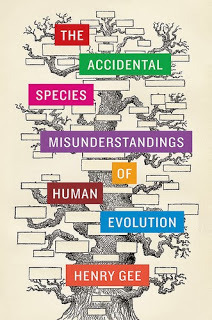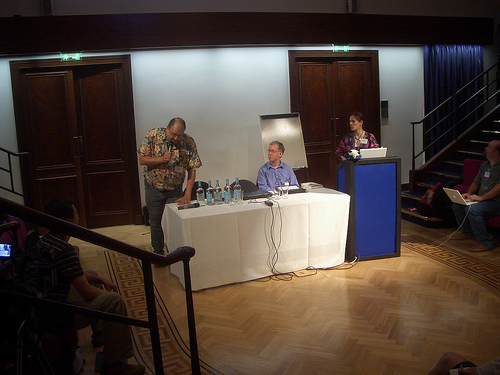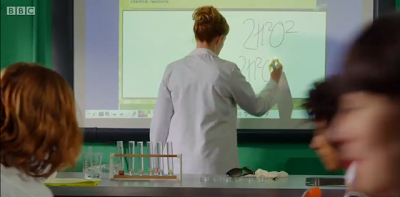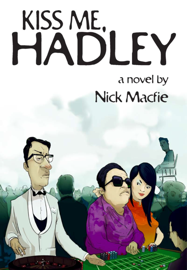Brian Clegg's Blog, page 108
November 5, 2013
Braindead at the Beeb
 I'm delighted that my latest guest post is from the inestimable Henry Gee: Henry is a Senior Editor of Nature. His latest book ‘The Accidental Species: Misunderstandings of Human Evolution’, is now available from the proverbial All Good Bookshops. His blog The End Of The Pier Show continues to delight its three regular readers. DISCLAIMER: for readers for whom rhetorical devices are as giraffes to unicycles, no kittens were harmed in the making of this post.
I'm delighted that my latest guest post is from the inestimable Henry Gee: Henry is a Senior Editor of Nature. His latest book ‘The Accidental Species: Misunderstandings of Human Evolution’, is now available from the proverbial All Good Bookshops. His blog The End Of The Pier Show continues to delight its three regular readers. DISCLAIMER: for readers for whom rhetorical devices are as giraffes to unicycles, no kittens were harmed in the making of this post.GUEST POST
Brian, for it is he, has invited me to write a guest post for his blog, so here I am, not too late I hope, with a bottle of wine and a smile, though I decided against buying the flowers on the garage forecourt as they looked rather tired. Goldie looks up from her cosy spot in the corner, raises an eyebrow and sensibly goes back to sleep.
I’ve known Brian for six years or so, ever since we both had blogs on Nature Network (now SciLogs). We’ve even met two or three times in real life. Just to show you that we take this science business seriously, we did, on one occasion, share a podium at the Royal Institution. Here we are, with author Clare Dudman:

We share interests in all sorts of things from writing and music to dogs and the zany antics of Boris Johnson. Another thing we share is a general despondency at the scientific illiteracy of people in general – especially among people who should know better.
 Like those at Casa Clegg, we watch chez Gee a televisual emission called ‘Waterloo Road’, a soap opera of the doings at a comprehensive school in the north of England. Brian noticed, as did I, that on one occasion the science teacher wrote the formula for hydrogen peroxide on the board as H2O2, with the ‘2’s as superscripts rather than subscripts. Who let that howler through?
Like those at Casa Clegg, we watch chez Gee a televisual emission called ‘Waterloo Road’, a soap opera of the doings at a comprehensive school in the north of England. Brian noticed, as did I, that on one occasion the science teacher wrote the formula for hydrogen peroxide on the board as H2O2, with the ‘2’s as superscripts rather than subscripts. Who let that howler through?But wait, there was more. In another episode of ‘Waterloo Road’, Brian noticed that the chlorine molecule, Cl2, was described as C12 (C twelve) – someone had misread the ‘L
’ as a 1’. (I confess I didn’t see that episode. I was in my shed at the time, listening to my tapes of kittens being impaled on red-hot skewers.) Once again, didn’t anyone notice?
Such programmes are watched by quite a lot of people, notwithstanding inasmuch as which those of school age, and their teachers. They are indeed avidly lapped up by the younger Gees (13 and 15) and Mrs Gee (a learning support assistant.) So you’d hope that the people making the programme would take some care with its content. First, the people who write this stuff. Then there are the script editors, the producers, the editors, the directors. Did anyone notice? If not, why not? To anyone with more than a gnat’s crotchet of scientific literacy, these errors would stick out like a sore thumb.
I can think of three reasons why such errors were left until broadcast. First, the people responsible didn’t even have as much science as that. Second, they might have had that much science, but were plain incompetent. Third, they just didn’t care, because such things are, to them, small and unimportant details. Quite apart from the necessity in dramas, even those as ridiculous and over-the-top as ‘Waterloo Road’ (an establishment where fires, poisoning and brutal murder are not unknown), that details are important to maintain the suspension of disbelief, this betrays an insouciant ignorance that should not be tolerated.
Now, I’m not talking about the televisual ghetto in which science is usually confined, which, if its offerings are designed for a general audience, speak to us as if we are small children, in what Rabbi Lionel Blue once called the ‘let’s-all-be-bunnies’ voice. ‘Horizon’, the flagship science TV show on the BBC, is the worst offender. Its offerings are almost uniformly dreadful. Whenever reason fails me and I switch on, imagining’ hope against hope, that things couldn’t get any worse than the time before – they do.
The few episodes of ‘Horizon’ that treat us like adults are proofs in the breach. One thinks of Simon Singh’s wonderful film for ‘Horizon’ on Andrew Wiles and the solution to Fermat’s Last Theorem. How could any TV program succeed that was about maths? When he suggested the subject to the BBC commissioners, Singh recalled at a lecture I attended, “you could see they’d have preferred a program called ‘Fermat’s Last Dinosaur’ or ‘Fermat’s Last Volcano’.” The fault, then, lies in a broadcasting culture in which science is seen as something for small children. If it is for older children, or – gasp – adults, it’s aimed at a self-selected audience of geeks, with a presenter who looks like the cool older brother you never had (Brian Cox) or an indulgent grandparent who might be persuaded to dispense a Werther’s Original (David Attenborough).
But I digress.
Science literacy is poor, and this is especially true of TV, in which the arts, politics and current affairs are usually presented to a high level. What I contend here is that it’s so poor that it reflects an almost deliberate carelessness on the part of the people who churn it out. And that’s shocking. If the commissioners of the BBC would (or so one would hope) never let through a humanities programme that treats its audience as if they were watching ‘Playschool’, why is science presented in such a jejune fashion?
Do broadcasters, seeing that many toddlers can pronounce words such as ‘Triceratops’ while still in diapers, assume that science is a form of children’s programming, something that might not be of interest to intelligent adults?
Is this why broadcasters, remembering that they once in childhood saw ‘Captain Pugwash’, pronounce ‘boson’ as ‘bosun’? If anyone does that to me, especially if it’s live TV, I shall mention Higgs the Bosun’s shipmates – Master Bates, Seamen Stains and Roger the Cabin Boy.
Published on November 05, 2013 00:02
November 4, 2013
Stephen Fry caught mooning on QI
 Call that a moon? THIS is a moon!
Call that a moon? THIS is a moon!(Apologies to Crocodile Dundee)I am very fond of QI, but as I have mentioned previously, there are times when the QI elves' attempts to be perverse just to be able to catch the contestants out result in a warping of reality as we know it.
One of the most dramatic examples of this over the years has been their varying answers to the question 'how many moons does the Earth have?' While the show has been running the accepted QI answer has been various numbers between 2 and 20,000, but never one, the obvious and actual answer. But I have to say, if I were ever on the programme I would protest loud and long if hit by this question, because that answer of 'one' is correct.
They excuse their latest, 20,000 (that's from memory - it was some large number) value by saying there are lots of little lumps of rock that get captured by Earth's gravitational field for a few days and while captured they are natural satellites, which makes them moons. But this is the excrement of the male cow. You might as well say the Sun has many thousands of planets, because of all the asteroids, as a planet is a satellite of the Sun. However, we all know there are just eight planets.
Now to be fair, with planets there are clearer rules. To be a planet the body has to (in my wording):
Orbit the SunBe roughly sphericalHave swept its orbit clean of minor debris... this last one being what did for Pluto. But I would suggest, whether or not there is an IAU definition of 'moon' as there is for 'planet' there are still clear intended consequences of using the word 'moon' as opposed to just 'satellite'. These are that the body in question should be:
Long lasting - I suggest staying in orbit for at least 1,000 yearsSizeable - say at least 5 kilometres acrossThis would still allow moon status for the pretty dubious companions of Mars, Phobos and Deimos, which are about 20 kilometres and 10 kilometres across.
Clearly such rules are there implicitly when we talk about moons. If the time rule didn't exist, then every lump of rock that spent 5 minutes in our company would be a moon, while without the size rule, we would have to count every tiny piece of debris in Saturn's rings as a moon - every one of them is, after all, a natural satellite.
No, I'm sorry QI, but everyone who is not a teenager or drunk realises that mooning is not funny, and it's not clever, and it's time you gave it up.
Image from Wikipedia
Published on November 04, 2013 00:18
November 1, 2013
Down the line
 We really don't appreciate enough the wonders that information and communication technology enables. The smartphone in our pockets gives us abilities that only James Bond had when I was young. And earlier this week I had a brilliant example of the way ICT can transform the way we work when I spent the day in a school in Amman, Jordan without leaving my office.
We really don't appreciate enough the wonders that information and communication technology enables. The smartphone in our pockets gives us abilities that only James Bond had when I was young. And earlier this week I had a brilliant example of the way ICT can transform the way we work when I spent the day in a school in Amman, Jordan without leaving my office.I've done quick Q and A on occasions via Skype with a school before, but nothing on this scale.
Overall it was remarkably effective. Now I can hear the technophobes in the background (what are you doing reading a blog, you old fogies?) saying 'Ah, but it's not like really being there!' And for once they are right. That is perfectly true. But there are plenty of occasions when being there is just not practical, and this is certainly the next best thing. What's more, it even saves the school money (something most schools are not averse to), because they don't have to pay for my travel. And I can do it in my slippers.
We had two-way video set up and the outcome was better than I could have imagined. I ran interactive sessions - I could see them with their hands up, as long as they spoke nice and loud I could hear what they were saying and this two way visual communication gave some real benefit. (I've had lovely emails from the school emphasising this.) Just how important the video link was was brought home in the first session of the day (not helped, I admit by starting at 5am because of the time difference), when technical problems meant I had to do a chunk of the session 'blind.' Not seeing the audience made a huge difference - and not a good one.
I know lots of people use Skype to keep in touch with distant loved ones. I've always found it a bit clumsy for this, as you have to schedule a chat and it feels far less spontaneous than phoning or texting. But for this particular application the technology came up trumps and made it possible to spend a day in a school that was, in reality, over two thousand miles away.
Published on November 01, 2013 01:27
October 31, 2013
Islands of birth and rebirth
Thanks to Nik Morton for a guest post suitable for Halloween. Nik spent 23 years in the Royal Navy as a writer, and after retiring from the Navy went into IT. He moved to writing for and editing magazines and now lives in Spain where he is concentrating on writing.
GUEST POST
 Malta is rich in history and scenic attraction. I first visited the island in 1967 when our ship HMS Zulu docked in Valletta harbour. I hadn’t been in the Royal Navy long – joined two years earlier. In those days, approaching foreign ports was always exciting. I’d been fascinated by Amsterdam, and Gibraltar was breath-taking. But Malta was something else again. The grandeur of the Grand Harbour has not diminished over the years – it’s still one of the most photogenic scenes I’ve come across.
Malta is rich in history and scenic attraction. I first visited the island in 1967 when our ship HMS Zulu docked in Valletta harbour. I hadn’t been in the Royal Navy long – joined two years earlier. In those days, approaching foreign ports was always exciting. I’d been fascinated by Amsterdam, and Gibraltar was breath-taking. But Malta was something else again. The grandeur of the Grand Harbour has not diminished over the years – it’s still one of the most photogenic scenes I’ve come across.
Going ashore in civilian clothes, I toured the island by local buses. They’re economical and cover virtually the entire island. On one journey, I got to the fish-tail of the island and caught the ferry across to Gozo, only in time to come back again. The islands comprise, Malta, Gozo, Comino, Cominotto and Filfla, comprising about 313 square km.
Some years later, in 1974, I was drafted to the RN Hospital, Mtarfa and lived with my new bride Jennifer in the city of Rabat, overlooking the verdant valley, the hospital in plain sight. Here, I conjured up the first ideas for a modern-day vampire novel set in Malta. Life, work and other commitments meant I didn’t progress with it.
Malta has museums of old bones, rocks, and pottery that tell of early times. In about 3,800 BC stone-age man lived in the rocky countryside in caves. His life was dominated by the sun which he saw rise early from the sea and soar overhead until it finally settled again into the sea at night. Birth and rebirth. The climate combined with the daily sun provided a bountiful gift. So to perpetuate this cycle they erected temples to the Goddess of Fertility. Using simple stone tools they built complex edifices of massive stone blocks at Hagar Qim, Mnajdra and Ggantija. At Hal-Saflieni they cut into soft rock, creating the underground temple of the Hypogeum.
As the centuries progressed, sailors, travellers and tradesmen emerged, and the island was on their route of exploration and trade. The first documented history of the islands was about 1400 BC, when Phoenician galleys carrying 200 men each sailed into harbour. They brought with them their language and customs. The galley designs still can be seen in the luzzu fishing boats that work at sea, as well as the dhajsa (diso in naval parlance) that served as water taxis in the harbour.
Malta was invaded time and again – Greeks, Etruscans and Carthaginians, amongst others. Then around 200 BC the Romans arrived. Under the Romans the islands flourished and it was during this period that the apostle Paul was on his way for trial in Rome when he became shipwrecked, cast ashore on Malta’s northern coast. He stayed for three months and began the long tradition of Christianity that is still evident wherever you look on the islands; apparently, they have a church for every day of the year.
By 800 AD the Arab empire was expanding and the islands came under their rule; it was a peaceful transition. The Arabs brought new farming techniques, shrubs and trees that would transform the land. Barren fields were altered, becoming fertile, with abundant vegetation. This rich period lasted almost 200 years until Roger the Norman took Malta to make it the southernmost outpost of the Norman conquest of Europe. Many fortifications still found on the island hark back to this time.
By 1530 the islands had passed into the fiefdom of the Holy Roman Emperor, Charles V. He granted the islands to the Order of St John, who’d recently been driven out of Rhodes by the armada of Suliman the Magnificent. He asked the Knights for rent, one falcon a year.
 The knights strengthened the fortifications, especially around Grand Harbour.
The knights strengthened the fortifications, especially around Grand Harbour.
In May 1565 the Turkish fleet arrived; 200 ships carrying 40,000 troops and a battery of artillery. Facing them mustered 700 knights and 7,000 Maltese volunteers and mercenaries. Defeat seemed inevitable. Brave defenders held on for four months until a relief force arrived from Sicily. The Turks fled for home, an utterly broken force, having sustained a loss of more than 30,000 men.
In case the islands were again invaded, fortifications continued, and the city was renamed Valletta in honour of the great Grand Master, La Vallette, who had repulsed the Turks.
By the end of the 18th century, the knights had mostly forgotten their religious calling and taken to a life of luxury and decadence. In 1798, Napoleon Bonaparte sailed into the harbour on his way to conquer Egypt. The knights surrendered without a fight, and the order was dissipated. The Maltese soon found that their new French overseers were merely intent on pillaging the islands, so the Maltese sought the aid of the English. In 1800, Nelson blockaded the harbour and the French garrison surrendered. This ushered in 160 years of British rule.
That’s a very brief history of the islands. It’s rich in prehistoric temples, neolithic sculptures and grand old cities like the silent city of Mdina, which was begun in Roman times. Many historical or fantasy TV and movie films have used these places as backdrop, not least Gladiator and Game of Thrones.

Once retired to Spain, I found time at last to concentrate on the novel I’d always wanted to write. The intervening years meant that I could do the story justice. This became Death is Another Life. I have also written the screenplay of the book.
A lengthy flashback to 1573 in my novel features two knights who succumb to the wiles of a female vampire and become undead as well. They survive to the present day. A small excerpt:
Jennifer and I have been back to Malta a number of times. It’s a fascinating destination and I can highly recommend it – without the black magic and vampires, of course!
Find out more about Nik and his book at his website
.
GUEST POST
 Malta is rich in history and scenic attraction. I first visited the island in 1967 when our ship HMS Zulu docked in Valletta harbour. I hadn’t been in the Royal Navy long – joined two years earlier. In those days, approaching foreign ports was always exciting. I’d been fascinated by Amsterdam, and Gibraltar was breath-taking. But Malta was something else again. The grandeur of the Grand Harbour has not diminished over the years – it’s still one of the most photogenic scenes I’ve come across.
Malta is rich in history and scenic attraction. I first visited the island in 1967 when our ship HMS Zulu docked in Valletta harbour. I hadn’t been in the Royal Navy long – joined two years earlier. In those days, approaching foreign ports was always exciting. I’d been fascinated by Amsterdam, and Gibraltar was breath-taking. But Malta was something else again. The grandeur of the Grand Harbour has not diminished over the years – it’s still one of the most photogenic scenes I’ve come across.Going ashore in civilian clothes, I toured the island by local buses. They’re economical and cover virtually the entire island. On one journey, I got to the fish-tail of the island and caught the ferry across to Gozo, only in time to come back again. The islands comprise, Malta, Gozo, Comino, Cominotto and Filfla, comprising about 313 square km.
Some years later, in 1974, I was drafted to the RN Hospital, Mtarfa and lived with my new bride Jennifer in the city of Rabat, overlooking the verdant valley, the hospital in plain sight. Here, I conjured up the first ideas for a modern-day vampire novel set in Malta. Life, work and other commitments meant I didn’t progress with it.
Malta has museums of old bones, rocks, and pottery that tell of early times. In about 3,800 BC stone-age man lived in the rocky countryside in caves. His life was dominated by the sun which he saw rise early from the sea and soar overhead until it finally settled again into the sea at night. Birth and rebirth. The climate combined with the daily sun provided a bountiful gift. So to perpetuate this cycle they erected temples to the Goddess of Fertility. Using simple stone tools they built complex edifices of massive stone blocks at Hagar Qim, Mnajdra and Ggantija. At Hal-Saflieni they cut into soft rock, creating the underground temple of the Hypogeum.
As the centuries progressed, sailors, travellers and tradesmen emerged, and the island was on their route of exploration and trade. The first documented history of the islands was about 1400 BC, when Phoenician galleys carrying 200 men each sailed into harbour. They brought with them their language and customs. The galley designs still can be seen in the luzzu fishing boats that work at sea, as well as the dhajsa (diso in naval parlance) that served as water taxis in the harbour.
Malta was invaded time and again – Greeks, Etruscans and Carthaginians, amongst others. Then around 200 BC the Romans arrived. Under the Romans the islands flourished and it was during this period that the apostle Paul was on his way for trial in Rome when he became shipwrecked, cast ashore on Malta’s northern coast. He stayed for three months and began the long tradition of Christianity that is still evident wherever you look on the islands; apparently, they have a church for every day of the year.
By 800 AD the Arab empire was expanding and the islands came under their rule; it was a peaceful transition. The Arabs brought new farming techniques, shrubs and trees that would transform the land. Barren fields were altered, becoming fertile, with abundant vegetation. This rich period lasted almost 200 years until Roger the Norman took Malta to make it the southernmost outpost of the Norman conquest of Europe. Many fortifications still found on the island hark back to this time.
By 1530 the islands had passed into the fiefdom of the Holy Roman Emperor, Charles V. He granted the islands to the Order of St John, who’d recently been driven out of Rhodes by the armada of Suliman the Magnificent. He asked the Knights for rent, one falcon a year.
 The knights strengthened the fortifications, especially around Grand Harbour.
The knights strengthened the fortifications, especially around Grand Harbour.In May 1565 the Turkish fleet arrived; 200 ships carrying 40,000 troops and a battery of artillery. Facing them mustered 700 knights and 7,000 Maltese volunteers and mercenaries. Defeat seemed inevitable. Brave defenders held on for four months until a relief force arrived from Sicily. The Turks fled for home, an utterly broken force, having sustained a loss of more than 30,000 men.
In case the islands were again invaded, fortifications continued, and the city was renamed Valletta in honour of the great Grand Master, La Vallette, who had repulsed the Turks.
By the end of the 18th century, the knights had mostly forgotten their religious calling and taken to a life of luxury and decadence. In 1798, Napoleon Bonaparte sailed into the harbour on his way to conquer Egypt. The knights surrendered without a fight, and the order was dissipated. The Maltese soon found that their new French overseers were merely intent on pillaging the islands, so the Maltese sought the aid of the English. In 1800, Nelson blockaded the harbour and the French garrison surrendered. This ushered in 160 years of British rule.
That’s a very brief history of the islands. It’s rich in prehistoric temples, neolithic sculptures and grand old cities like the silent city of Mdina, which was begun in Roman times. Many historical or fantasy TV and movie films have used these places as backdrop, not least Gladiator and Game of Thrones.

Once retired to Spain, I found time at last to concentrate on the novel I’d always wanted to write. The intervening years meant that I could do the story justice. This became Death is Another Life. I have also written the screenplay of the book.
A lengthy flashback to 1573 in my novel features two knights who succumb to the wiles of a female vampire and become undead as well. They survive to the present day. A small excerpt:
“Indeed,” he said, pressing her hand on his chest, where she felt his heart beating. “I’m one of the undead. But we’re in unknown territory, my dear. Though I have lived long, I still crave to live longer.”I’ve used real places in the islands for the dramatic scenes, whether that’s the impressive church in Mosta, with its unsupported dome, the silent city of Mdina, the prehistoric sites of Mnajdra, Hagar Qim, and Ghar Dalam. The fascinating streets of Valletta, the delightful karozzin carriages that pose a lethal threat, the salt pans on Gozo, all figure in the book, as do Gozo’s church of miracles at Ta Pinu and the eerie Calypso’s Cave. Combined with the vampirism is black magic, of the Dennis Wheatley variety, dark and ugly, even touching upon the ‘the Buxen’ of 1778 in Venice.
Maria shook her head. “I’m finding it hard to get my head round this. I mean, you’re over 400 years old –”
“Yes, and the sunlight plays havoc with my skin. I have to use barrier creams.”
She started. “Your reflection–”
“Yes, what about it?”
“You have one!”
He laughed, the sound echoing. “A myth. Some laws of physics can’t be broken by the supernatural.”
“Garlic – does it repel you?”
“Only if I hadn’t eaten it at the same meal as you.”
“Your skin – you mentioned barrier creams. Does that mean–?”
“No, sunlight won’t turn me into a pile of dust. It will age my skin, though.” He stroked his chin and grinned. “And as this skin has to last me quite a few centuries, I’d rather it didn’t suffer too much. I’m more fortunate than those sufferers of porphyria, who are confined to a life of darkness; anything stronger than a 40-watt lamp and the skin will shrink under scalding blisters. Necrosis of the skin is not uncommon. Acute varieties of the ailment can be very painful.”
“That rings a bell. I think it’s treated with blood. In fact, wasn’t porphyria used as a scientific explanation to support the existence of vampires?”
He nodded. “A pint or two of heme can ease the symptoms. Yes, heme as in hemoglobin.” He smiled. “Of course, there’s no basis in fact that porphyria is in any way related to vampirism.”
She couldn’t resist an exasperated, “Are any of the stories true about vampires?”
“Some.”
Jennifer and I have been back to Malta a number of times. It’s a fascinating destination and I can highly recommend it – without the black magic and vampires, of course!
Find out more about Nik and his book at his website
.
Published on October 31, 2013 02:11
October 30, 2013
Hip pip USA
 It's quite popular to knock the USA. And there is no doubting that politics there has got into an awful mess, and from Europe it's very difficult to understand why there is such an aversion to universal health care, or such a love for the gun. But I feel in our relationship with America we are in danger of falling into that dangerous trap of relationships where you always spend time niggling and pointing out fault and never find time to say how great the other person is.
It's quite popular to knock the USA. And there is no doubting that politics there has got into an awful mess, and from Europe it's very difficult to understand why there is such an aversion to universal health care, or such a love for the gun. But I feel in our relationship with America we are in danger of falling into that dangerous trap of relationships where you always spend time niggling and pointing out fault and never find time to say how great the other person is. I say this because we shouldn't forget there's a lot to like about America. Pretty well every American I've met has been a warm, friendly, helpful person, and I'm delighted to count a lot of Americans among my online friends and/or readers of my books.
There's a lot to be said too for American culture. We might moan about Hollywood's attitude to the rest of the world and occasional schlockiness, but the fact is the US makes some great films, music, TV shows and more. You won't hear me moaning about Halloween or school proms being imported over here - I think they work well and are fun. And no one could doubt the huge contribution the US has made to science and technology.
Then there's American food. I love a proper hamburger, good Tex Mex is probably amongst favourite cuisine... And I could go on at length. (Of course there are aberrations like US chocolate and spray cheez (sic), but I'm talking about the good US food).
So don't just point out the problems, inevitable with any foreign affair. Remember the good side of the United States as well.
Image from Wikipedia
Published on October 30, 2013 02:55
October 29, 2013
Physiological Facts Concerning the Female Pheromone
Time for another guest post. Robin Walker was born in Worcestershire, and after reading Classics at Cambridge, he emigrated to the then Rhodesia with my family. A few years later, he joined the Ministry of Internal Affairs as a cadet, retiring as a District Commissioner in 1980, by which time Rhodesia had become Zimbabwe. His book, Last Orders at the Changamire Arms, was published last month by Mark Lloyd of Pillar International Publishing. It's a humorous account of his last years in the ministry, and the great people he was privileged to meet and work with. He has written a novel, also laced with humour, on the life of the Greek hero, Herakles, probably better known as Hercules. Apart from that, he is engaged in beating his head against traditional academic walls with his fresh approach to the similes of Homer's Iliad.
GUEST POST
 American research has come up with an interesting angle on fishing. It has brought to light an idea I have been hooked on for some while, and that is that women anglers catch more fish than men (nice little ambiguity). Apparently, when a woman plunges her hand into the tin wherein she keeps her bait she passes on the scent of her female pheromones to its contents, so that when she skewers her worm to the hook and casts it into the water, the poor creature so reeks of the stuff that he passes it on to his immediate surroundings. Now, if, while the worm is lighting up a cigarette to while away the time, a fish swims into the vicinity, it finds the scent of the worm so mind-bending it goes into a frenzy and gobbles up everything in sight, hook, line and sinker. Worm and cigarette.
American research has come up with an interesting angle on fishing. It has brought to light an idea I have been hooked on for some while, and that is that women anglers catch more fish than men (nice little ambiguity). Apparently, when a woman plunges her hand into the tin wherein she keeps her bait she passes on the scent of her female pheromones to its contents, so that when she skewers her worm to the hook and casts it into the water, the poor creature so reeks of the stuff that he passes it on to his immediate surroundings. Now, if, while the worm is lighting up a cigarette to while away the time, a fish swims into the vicinity, it finds the scent of the worm so mind-bending it goes into a frenzy and gobbles up everything in sight, hook, line and sinker. Worm and cigarette.
There's nothing fishy about all this. It's true.
Even worms fall under the spell of these phenomenal, female pheromones and will fight each other to the death just for the privilege of first place on the hook. Indeed, I once saw a worm so overcome by the scent of a lady angler that it whipped off its coat, being careful to fold it up before laying it on the grass, dived into the river, and emerged moments later, swimming furiously towards the bank and trailing in its wake one of the biggest wahoos I've ever seen. Or was it a golden orfe?
You can find out more about Robin's book on Amazon.co.uk and Amazon.com
I ought to say in a spirit of scientific balance, that I couldn't find any proper research to support the female pheromone fishing theory (it may be out there, but I haven't seen it), so this story needs to be taken with a fairly hefty pinch of ground bait. BC
GUEST POST
 American research has come up with an interesting angle on fishing. It has brought to light an idea I have been hooked on for some while, and that is that women anglers catch more fish than men (nice little ambiguity). Apparently, when a woman plunges her hand into the tin wherein she keeps her bait she passes on the scent of her female pheromones to its contents, so that when she skewers her worm to the hook and casts it into the water, the poor creature so reeks of the stuff that he passes it on to his immediate surroundings. Now, if, while the worm is lighting up a cigarette to while away the time, a fish swims into the vicinity, it finds the scent of the worm so mind-bending it goes into a frenzy and gobbles up everything in sight, hook, line and sinker. Worm and cigarette.
American research has come up with an interesting angle on fishing. It has brought to light an idea I have been hooked on for some while, and that is that women anglers catch more fish than men (nice little ambiguity). Apparently, when a woman plunges her hand into the tin wherein she keeps her bait she passes on the scent of her female pheromones to its contents, so that when she skewers her worm to the hook and casts it into the water, the poor creature so reeks of the stuff that he passes it on to his immediate surroundings. Now, if, while the worm is lighting up a cigarette to while away the time, a fish swims into the vicinity, it finds the scent of the worm so mind-bending it goes into a frenzy and gobbles up everything in sight, hook, line and sinker. Worm and cigarette.There's nothing fishy about all this. It's true.
Even worms fall under the spell of these phenomenal, female pheromones and will fight each other to the death just for the privilege of first place on the hook. Indeed, I once saw a worm so overcome by the scent of a lady angler that it whipped off its coat, being careful to fold it up before laying it on the grass, dived into the river, and emerged moments later, swimming furiously towards the bank and trailing in its wake one of the biggest wahoos I've ever seen. Or was it a golden orfe?
You can find out more about Robin's book on Amazon.co.uk and Amazon.com
I ought to say in a spirit of scientific balance, that I couldn't find any proper research to support the female pheromone fishing theory (it may be out there, but I haven't seen it), so this story needs to be taken with a fairly hefty pinch of ground bait. BC
Published on October 29, 2013 05:28
October 28, 2013
A curate's novel
 Every now and then I'm sent a review request for a novel that catches my eye, and this was the case with Kiss Me, Hadley by Nick Macfie. Featuring a news agency reporter who goes undercover in an illegal casino in Hong Kong, but with a comic twist, it sounded rather intriguing. I was a bit disappointed when the book came as it has the look and feel of print on demand (though the layout and editing is fine), which never feels quite like a 'real' book, but I managed to ignore this.
Every now and then I'm sent a review request for a novel that catches my eye, and this was the case with Kiss Me, Hadley by Nick Macfie. Featuring a news agency reporter who goes undercover in an illegal casino in Hong Kong, but with a comic twist, it sounded rather intriguing. I was a bit disappointed when the book came as it has the look and feel of print on demand (though the layout and editing is fine), which never feels quite like a 'real' book, but I managed to ignore this.The reality of reading Kiss Me, Hadley was entirely curate's egg. Let's do the good bit first. Macfie is great at the setting, really getting us into the sleazy casino world and particularly making Hong Kong come alive. The action scenes, especially those set in a casino, are engaging and pull the reader along effortlessly. These parts of the book are great, and if somehow they could be extracted and interlaced with better dialogue and modified in the ending, this could be a brilliant read.
However. I don't know if it's because the author is trying too hard to be funny, but the dialogue is a disaster. Almost always when two characters converse their conversation meanders all over the place, is full of non sequiturs and simply doesn't make any sense. It doesn't read like a conversation at all. It is just very strange and spoiled the book for me.
As for the rest, leaving aside the totally bizarre involvement of the Conservative Party (don't ask), the ending doesn't tie things up well enough, leaving the very dramatic and puzzling final game at the casino totally unexplained. Macfie sets up lots of things that need explaining and then doesn't bother to do so, which is frustrating.
When it's going well, Macfie reminds me of the best of Leslie Thomas without the sex scenes. That might be what Thomas was best known for, but he was very good at putting a tragicomic main character in dangerous and/or exotic circumstances and making it a cracking good tale. Macfie can do this too - but without serious surgery on that dialogue, the book just doesn't hold up.
You can see more about Kiss Me Hadley at Amazon.co.uk and Amazon.com
Published on October 28, 2013 02:02
October 25, 2013
Bob who?
 I know I am going to infuriate some musical tastes here, but I really don't get the appeal of Bob Dylan.
I know I am going to infuriate some musical tastes here, but I really don't get the appeal of Bob Dylan.Part of the problem is likely to be that, musically speaking, I am a child of the 70s rather than the 60s. I didn't buy my first album until 1970 (admittedly that was the Beatles, but it was late Beatles), so I never felt any of the emotional attachment that many do to the whole ethos of the 60s - but what that means is that I listen to Dylan as music per se, and to my mind he comes up wanting.
My modernised folk (I think folk rock is too heavy a term) heroes would be Simon & Garfunkel and Al Stewart (who I saw perform last Saturday - at age 68, he is still going strong, unlike certain croaky elderly types, naming no names). For me they are streets ahead of Dylan. Now don't start moaning to me how my choices are much too light and fluffy, and not meaningful enough. I'm talking about their merits as songwriters, not as revolutionaries. Don't be an intellectual snob.
Why don't I like Dylan? Well, it doesn't help that I can't stand the harmonica, but basically I have three problems. He can hardly sing, there's just a sort of blaring croak that makes the present day Paul McCartney sound musical. (Oops, named that name.) Secondly I can only understand one word in three. There's no point being deep and meaningful if you can't enunciate. And finally his 'tunes' are monotonous, often literally. It's like listening to a goat trying to sing.
Now don't complain if Dylan's your musical hero. There is no objectivity in music appreciation. Just as I managed to wind up a lot of people by pointing out what a load of rubbish opera is, similarly I'm sure this will hit a tender spot with some. But this is my subjective opinion, which when it comes to music is all you can possibly do, and is just as valid as any other.
If you haven't heard Al Stewart, or only know Year of the Cat, one of the reasons I like him is he does a lot of songs with historical content. I wanted to include one of my all time favourites, Josephine Baker, as it is so simple yet evocative, but it doesn't appear to be on YouTube, so I am instead popping in one of his more engineered numbers, Antarctica, in part to share something he said at the concert, which was that despite apparently being about the attempts to get to the South Pole, this is a really a song about a woman who didn't find him attractive.
One more, to show a more straightforward history song, Lord Grenville, but also one that's interesting to demonstrate Stewart's humour, as I hadn't spotted into recently that musically it's a tribute to Space Oddity, but once you realize that, it's pretty obvious.
Image from Wikipedia
Published on October 25, 2013 03:03
October 24, 2013
Artists, scientists and stretching things
I'm going to be running a series of guest blogs over the next few weeks and the first is from Sue Guiney. According to Sue: 'I'm a writer of fiction, poetry, plays. I'm a teacher of fiction, poetry, plays. Born and raised in New York, I've made my life in London with my husband and two sons. I'm grateful for it all.' I had the pleasure of doing a science/literature event with Sue a couple of years ago and loved her book Tangled Roots.
It seems to be festival season around here. Bankside, London, is in the midst of the Merge Festival, which is the local immersive arts festival. Its aim is to provide a series of events which showcase and draw on the rich heritage and contemporary culture of this area of London's south bank.
 Last night I went along to a demonstration and networking evening where artists and scientists came together to chat, drink wine, amaze each other with the incredible ideas we all have, and especially to watch a demonstration of the Kirkaldy Testing Machine. I can not begin to tell you how incredibly cool this was.
Last night I went along to a demonstration and networking evening where artists and scientists came together to chat, drink wine, amaze each other with the incredible ideas we all have, and especially to watch a demonstration of the Kirkaldy Testing Machine. I can not begin to tell you how incredibly cool this was.
The Kirkaldy testing works is a purpose-built Victorian era building which was built specifically around this enormous industrial age hydraulic masterpiece in 1874. Proudly declaring above the door
 Thanks to the Kirkaldy Museum for this
Thanks to the Kirkaldy Museum for this
photo of David KirkaldySo, imagine a large, Victorian brick building with its ground floor housing an enormous labyrinth of pipes and wheels and weights and counterweights and pulleys and levers, stray pieces of metal lying around the floor, weird things hanging from the ceiling, anvils and hammers and then, once it got started, all manner of clanks and grinds and screeches. Magnificent. Last night, they were testing a piece of sculpture created by James Capper, an artist who creates kinetic sculptures based on industrial machinery, inventing new forms and functions for these machines while he's at it.
I was in heaven. This appealed to all my knee-jerk "Gee Mr Wizard" impulses. A room full of weird stuff with a roomful of quirky people all trying to explain and reimagine it. It's interesting to me how I do rather quietly nurture this weird side of my personality. I know I talk a lot about Cambodia and music and teaching, but various aspects of science are continually cropping up in my work. There was my recent contribution to the anthology of science-fiction poetry, Where Rockets Burn Through . There was my first novel, Tangled Roots , with its lost cosmological physicist. And the medical sciences are lurking everywhere in both A Clash of Innocents , and the soon-to-be-released, Out of the Ruins .
Clearly, I love science. But what I love just as much is the magic that happens when science meets art and when scientists meet artists. I think we find each other both funny and fascinating and are equally in awe of what we do and how we think. I love being part of this dialogue between two groups which, when I was growing up, kept themselves separate and were kept at a silly distance.
Question: What do you get when you lock a group of artists and a group of scientists in a room?
Answer:

It seems to be festival season around here. Bankside, London, is in the midst of the Merge Festival, which is the local immersive arts festival. Its aim is to provide a series of events which showcase and draw on the rich heritage and contemporary culture of this area of London's south bank.
 Last night I went along to a demonstration and networking evening where artists and scientists came together to chat, drink wine, amaze each other with the incredible ideas we all have, and especially to watch a demonstration of the Kirkaldy Testing Machine. I can not begin to tell you how incredibly cool this was.
Last night I went along to a demonstration and networking evening where artists and scientists came together to chat, drink wine, amaze each other with the incredible ideas we all have, and especially to watch a demonstration of the Kirkaldy Testing Machine. I can not begin to tell you how incredibly cool this was.The Kirkaldy testing works is a purpose-built Victorian era building which was built specifically around this enormous industrial age hydraulic masterpiece in 1874. Proudly declaring above the door
Facts not Opinionsthe first experiments took place here on iron and steel to determine their breaking point.
 Thanks to the Kirkaldy Museum for this
Thanks to the Kirkaldy Museum for thisphoto of David KirkaldySo, imagine a large, Victorian brick building with its ground floor housing an enormous labyrinth of pipes and wheels and weights and counterweights and pulleys and levers, stray pieces of metal lying around the floor, weird things hanging from the ceiling, anvils and hammers and then, once it got started, all manner of clanks and grinds and screeches. Magnificent. Last night, they were testing a piece of sculpture created by James Capper, an artist who creates kinetic sculptures based on industrial machinery, inventing new forms and functions for these machines while he's at it.
I was in heaven. This appealed to all my knee-jerk "Gee Mr Wizard" impulses. A room full of weird stuff with a roomful of quirky people all trying to explain and reimagine it. It's interesting to me how I do rather quietly nurture this weird side of my personality. I know I talk a lot about Cambodia and music and teaching, but various aspects of science are continually cropping up in my work. There was my recent contribution to the anthology of science-fiction poetry, Where Rockets Burn Through . There was my first novel, Tangled Roots , with its lost cosmological physicist. And the medical sciences are lurking everywhere in both A Clash of Innocents , and the soon-to-be-released, Out of the Ruins .
Clearly, I love science. But what I love just as much is the magic that happens when science meets art and when scientists meet artists. I think we find each other both funny and fascinating and are equally in awe of what we do and how we think. I love being part of this dialogue between two groups which, when I was growing up, kept themselves separate and were kept at a silly distance.
Question: What do you get when you lock a group of artists and a group of scientists in a room?
Answer:

Published on October 24, 2013 02:46
October 23, 2013
Wash your brain to avoid spreading false ideria
I hate the term 'meme', because I think there is a very poor parallel between genes and ideas (and it's a cringe-making word), but it can be quite handy when referring to a phenomenon that is very common online. It used to mostly happen through emails, but these days it is more likely to be a Facebook 'share' because it is easier to do.
Typically you get a message from a friend that either warns you of something dire ('Don't open a message like this! It's a computer virus!' or 'Don't use this product, people have been killed by it'), or says 'like this picture and something amazing will happen' (it won't), or tells you something outrageous that really underlines your suspicions about someone in the public eye (most recently that Michele Bachmann wants to ban Halloween).
By all means pass this kind of thing on if it's true - but just as it's a good idea to wash your hands to avoid spreading nasty bugs, so it's a good idea to 'wash your brain' by doing a quick check before passing on these nasty messages.
I'd suggest three quick checks, which can be done in a few seconds. This can a) prevent a red face when you discover you were duped later and b) avoid these silly messages clogging up the e-waves. So:Do a quick search on Snopes. This long-running urban legend site is particularly good on the kind of message about viruses and evil products that do the rounds.Also do a quick search on Waffles at Noon. Though not as comprehensive as Snopes, this site is often better on picking up the latest silliness that is spreading via social networks. Here's Waffles on that Bachmann story.Do a quick Google search. If it is a hoax, there will probably be a clear reference to this on the first page. I did a Google search on 'Michelle Bachmann halloween' and apart from the delight of finding out you can get a Bachmann halloween costume, it was rapidly clear that this was a hoax. (You may wonder how there can be a video of her speech (the bottom item on the picture below) - this is because it's a video showing a still picture with a man reading 'her' words.)
We all get caught out occasionally, but by using these simple checks you can minimize the embarrassment.
Incidentally, as 'memes' are clearly more like viruses or bacteria than like genes, perhaps we should call them miruses or ideria. Just a thought...
Typically you get a message from a friend that either warns you of something dire ('Don't open a message like this! It's a computer virus!' or 'Don't use this product, people have been killed by it'), or says 'like this picture and something amazing will happen' (it won't), or tells you something outrageous that really underlines your suspicions about someone in the public eye (most recently that Michele Bachmann wants to ban Halloween).
By all means pass this kind of thing on if it's true - but just as it's a good idea to wash your hands to avoid spreading nasty bugs, so it's a good idea to 'wash your brain' by doing a quick check before passing on these nasty messages.
I'd suggest three quick checks, which can be done in a few seconds. This can a) prevent a red face when you discover you were duped later and b) avoid these silly messages clogging up the e-waves. So:Do a quick search on Snopes. This long-running urban legend site is particularly good on the kind of message about viruses and evil products that do the rounds.Also do a quick search on Waffles at Noon. Though not as comprehensive as Snopes, this site is often better on picking up the latest silliness that is spreading via social networks. Here's Waffles on that Bachmann story.Do a quick Google search. If it is a hoax, there will probably be a clear reference to this on the first page. I did a Google search on 'Michelle Bachmann halloween' and apart from the delight of finding out you can get a Bachmann halloween costume, it was rapidly clear that this was a hoax. (You may wonder how there can be a video of her speech (the bottom item on the picture below) - this is because it's a video showing a still picture with a man reading 'her' words.)

We all get caught out occasionally, but by using these simple checks you can minimize the embarrassment.
Incidentally, as 'memes' are clearly more like viruses or bacteria than like genes, perhaps we should call them miruses or ideria. Just a thought...
Published on October 23, 2013 00:58



